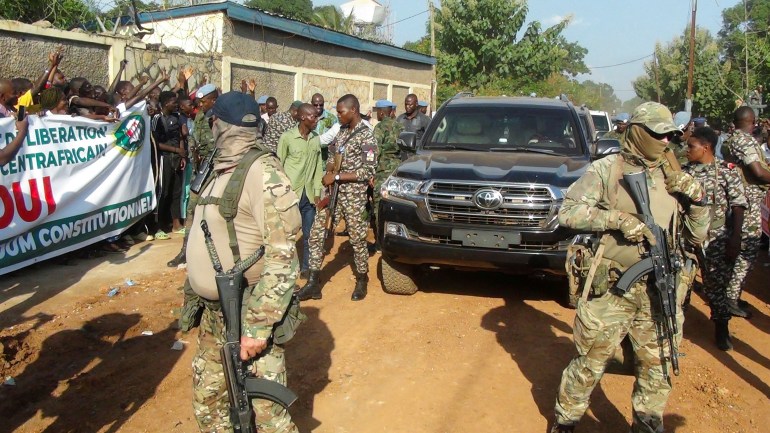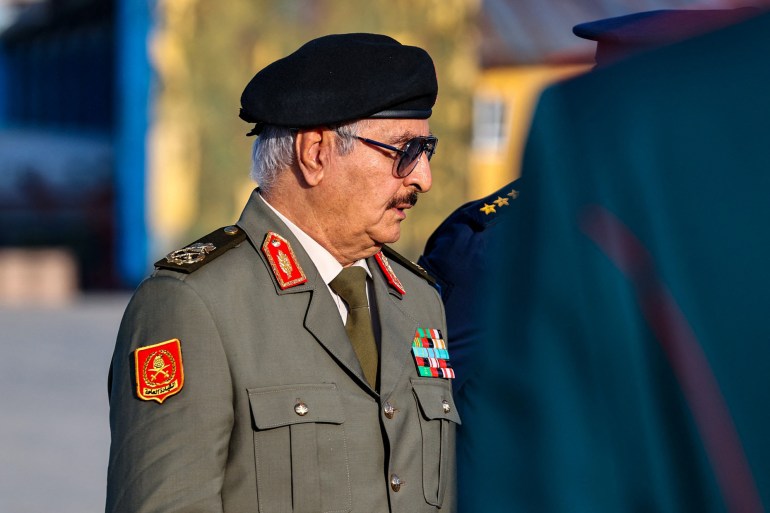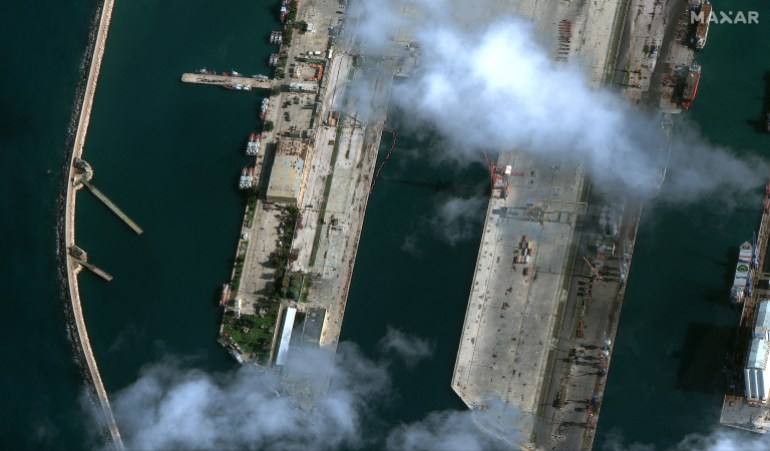Russia’s future in Syria may be a matter of debate, and analysts broadly agree that the loss of Syria will mean little to Russia in material terms.
However, that the Kremlin wants to retain its strategic footprint across the Mediterranean and Africa – developed over the last decade – is widely acknowledged.
During the course of Syria’s war, Russia provided vital military and diplomatic support critical to maintaining the rule of Bashar al-Assad.
In the process, it established a key airfield at Khmeimim and greatly expanded its Soviet-era naval base at Tartous, Russia’s only warm-water port.
With Syria in the hands of an administration headed by Hayat Tahrir al-Sham (HTS), the future of those bases is unclear, and reports suggest Russia has already partially withdrawn its forces.
The loss of the bases – vital links in the chain of influence from Moscow to the Mediterranean and into Africa – would be damaging, leaving Russia in need of an alternative.
Libya, where Russia already has a presence, is acknowledged as the only practical alternative should Russia decide to withdraw all or some of its forces from Syria.
However, what a sudden uptick in Russian military numbers might mean for a volatile Libya, as well as the implications of an enhanced Russian presence so close to NATO’s frontier remains to be seen.
Why not just give up and go home?
Expanding Russia’s presence in Africa through its positions in Syria and Libya had been a goal of Kremlin planners since about 2017, one “Russia had fought for” and was not ready to give up on, said Oleg Ignatov, a senior analyst with the International Crisis Group.
“Russia sees Africa as one of the main arenas of competition among the current great powers,” Ignatov said.
Russia, chiefly through its Kremlin-controlled military contractor, the Africa Corps (formerly the Wagner Group), maintains a military presence across much of Africa.

Currently, Africa Corps forces support the governments of Mali, Burkina Faso and Niger, all of whom severed ties with the West after recent coups.
In addition, the Africa Corps has reportedly proven vital, if ruthless, in preserving the rule of the Central African Republic’s government as well as supporting its allies in Sudan’s military after Moscow switched sides in that country’s civil war this year.
“It’s true the influence of Western powers in the continent may be diminishing, but the presence of others, such as China and Turkey, is growing, ” Ignatov said.
As such, maintaining at least one of their positions in Libya or Syria was, for Kremlin planners, an absolute, Ignatov told Al Jazeera.
“Libya offers Russia something unique – a foothold in both North Africa and the Mediterranean, perfect for projecting power into Europe’s soft underbelly and across the Sahel,” Anas El Gomati of the Tripoli-based Sadeq Institute said.
However, there is little evidence that eastern Libya is preparing for an influx.
Satellite imagery examined by Al Jazeera’s Sanad verification agency showed no new construction at any of Russia’s Libyan airfields or development at the port of Tobruk, an additional warm-water port Russia was reportedly considering for inclusion within its military fold long before the future of its counterpart at Tartous came into doubt.
“Don’t underestimate Tobruk’s potential. It’s not Tartous yet, but that’s exactly why Russia wants it. They’re not looking for what’s there now. They’re looking at what they can build,” El Gomati said.
“Remember, Tartous wasn’t always what it is today. Plus, Tobruk with Al Khadim airbase [a key Russian military hub near Benghazi] creates a powerful military complex that could challenge NATO’s southern flank.”
Internal upset
Libya has been locked in a power struggle of its own, one that the redeployment of Russia’s military from Syria to North Africa could upend.
Libya has known little stability since its revolution of 2011. It is administered by two governments, both accused of illegitimacy by critics – but neither is willing to cede ground until national elections can be held.

The last proposed elections fell through at the 11th hour in December 2021.
In the east sits the Government of National Stability (GNS), backed by self-declared leader, renegade military commander Khalifa Haftar. In the west sits the internationally recognised Government of National Accord, led by embattled Prime Minister Abdul Hamid Dbeibah, appointed temporarily in 2021 and hanging on to power ever since.
A September standoff between the two powers over the independence of the central bank was eventually drawn to a close through protracted negotiations overseen by mediators from the United Nations.
Buoyed by the success of that mediation and the holding of municipal elections in November, the UN last week announced new negotiations aimed at holding the first national vote since the failure of 2021.
The proposal, UN envoy to Libya Stephanie Koury told the Security Council, would help the country “overcome the current political deadlock and move … towards national elections and the renewal of legitimacy of Libya’s expired institutions”.
However, according to analysts such as Tarek Megerisi of the European Council on Foreign Relations, the establishment of a major Russian military hub in eastern Libya would give its ally Haftar an outsized voice in negotiations that he could walk away from without cost.
“If Russia decamps entirely to the east, Haftar will be able to do pretty much anything he wants,” Megerisi said, describing how Western powers would then try to appease Haftar in the hope of pulling him away from Russia.
The UN-proposed negotiations, he added, “wouldn’t be a negotiation”.
“Haftar … could dictate terms. Up to and including appointing a new prime minister, one which would only be in place until he inevitably fell out with Haftar. And then what?
“More bullets,” he concluded.
Geopolitical manoeuvrings
Haftar continues to be the target of Western diplomatic outreach despite the possibility of him offering Russia, the West’s geopolitical opponent, safe harbour just a few hundred nautical miles from NATO’s shores.
“The NATO threat isn’t overblown. It’s understated,” El Gomati said.

“This isn’t just about military bases. It’s about Russia creating pressure points on Europe’s migration routes, energy supplies and trade corridors. Libya’s position makes it a perfect platform for hybrid warfare,” he said.
In recent years, despite the eastern government’s established partnership with Putin, numerous Western officials have met with Haftar in a bid, analysts said, to “rehabilitate” his reputation in the West.
In August, commanders from the United States Africa Command, the European Union, United Kingdom and Italy each paid individual court to Haftar, describing their visits as intended to urge dialogue but, more often than not, to seek his help in curbing the flow of irregular migration, a trade both Haftar and his Russian allies have been accused of weaponising against Europe.
“The West’s need to rehabilitate Haftar makes little sense,” Megerisi said.
“He’s basically a Russian proxy. He has been since at least 2020” when Russia entered Libya’s civil war on Haftar’s behalf.
“Since then, his original army largely dissolved, to be replaced by a praetorian guard led by his own children. He’s massively distracted by internal difficulties and relies upon various criminal enterprises … to sustain his rule,” Megerisi said.
“For the Kremlin,” he said, “he’s perfect.”